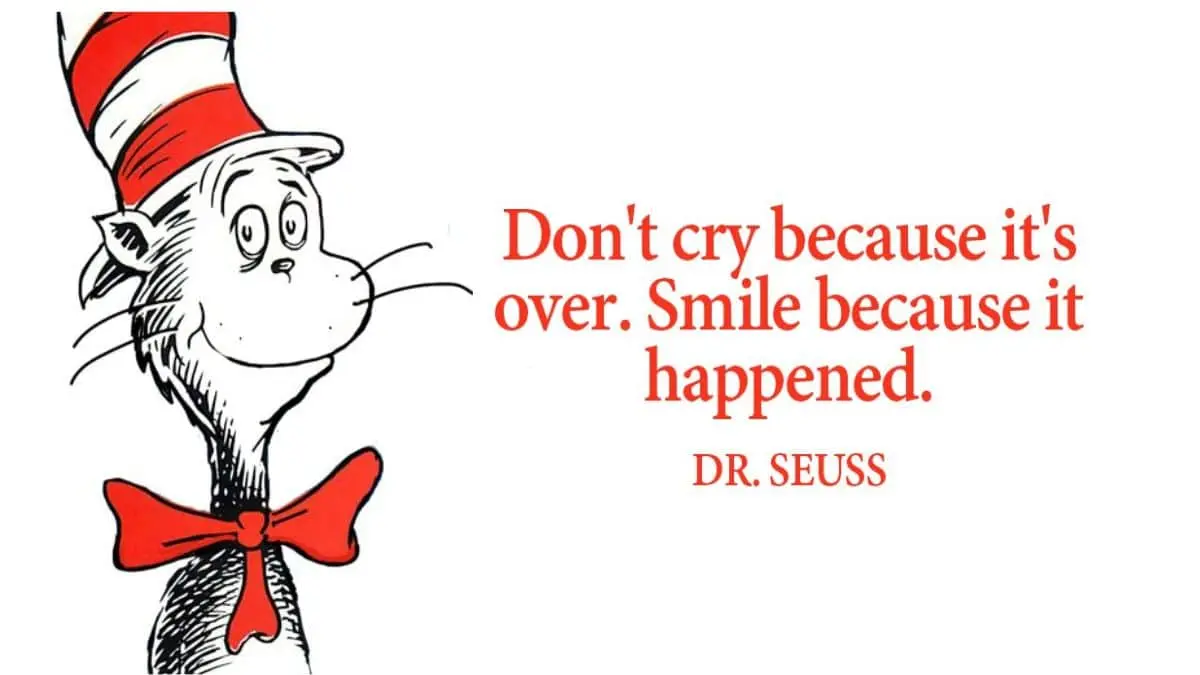Life is a tapestry woven with moments that build on each other, creating a vibrant fabric of experiences. These experiences often bring joy, sorrow, triumph, and lessons. One of the most beautiful quotes about appreciating the entirety of life’s journey was penned by the beloved children’s author, Dr. Seuss. Known for his whimsical rhymes and colorful illustrations, Dr. Seuss imparted a simple yet profound wisdom through his books. Among his many memorable quotes, one that continually reverberates is, “Don’t cry because it’s over, smile because it happened”.
This quote, succinct and powerful, holds a mirror to our human tendency to mourn the passing of pleasant times instead of celebrating the experiences we gained. Through this article, we aim to delve into the essence of this quote, exploring how it applies to our daily lives and why its wisdom is significant. We will delve into the psychological underpinnings of appreciating our moments, see how this quote translates to real-world scenarios, and provide practical tips to embrace this philosophy.
Interpretation of the Quote
At first glance, Dr. Seuss’s quote “Don’t cry because it’s over, smile because it happened” offers a simple, comforting message: to focus more on the joy of experience than the sorrow of its end. It encourages us to shift our perspective and acknowledge the value in every moment, whether it’s a relationship that has ended, a vacation that’s come to a close, or a milestone that has been reached and passed.
The fundamental idea behind this quote is the choice of perspective. It’s human nature to feel a sense of loss when good times come to an end. This quote, however, encourages us to flip that instinct on its head and instead cherish the fact that we had those experiences in the first place. It suggests that we should celebrate the opportunity to have lived these moments, learned from them, and grown as individuals.
The beauty of this quote lies in its universal applicability. It can resonate with anyone, as everyone has experienced the end of something they cherished. However, the interpretation may differ from person to person, and that’s where its charm lies. For some, it may be about a cherished relationship that has ended, teaching them invaluable life lessons about love and loss. For others, it might resonate with the completion of a project that they were deeply passionate about, leaving them with a sense of fulfillment and experience that will guide their future endeavors.
The Psychology of Appreciating Moments
Appreciating moments, as the quote by Dr. Seuss suggests, is rooted in the psychological concept of mindfulness. Mindfulness refers to the practice of being fully present in the moment, of consciously paying attention to our experiences as they happen, without judgment. It teaches us to live in the ‘here and now’, and it’s through this practice that we can truly appreciate the moments that make up our lives.
When we engage in mindfulness, we shift our focus from what has been lost (the past) or what is yet to come (the future), to what is happening right now. This shift allows us to fully immerse ourselves in the experience, thereby enhancing our appreciation for it.
Dr. Seuss’s quote also touches upon the concept of ‘nostalgia’, a sentiment of longing or affection for the past. While nostalgia was once considered a psychological disorder, it is now seen as a valuable coping mechanism that can foster self-continuity and promote mental well-being. Nostalgia, when experienced positively, can create a sense of happiness, social connectedness, and reduce feelings of loneliness. It allows us to look back at our experiences with fondness and appreciation, echoing the sentiment of “smiling because it happened.”
The benefits of adopting this mindful, nostalgic perspective are numerous. Research shows that individuals who regularly express gratitude for their experiences report higher levels of positive emotions, life satisfaction, vitality, optimism, and lower levels of depression and stress. This practice can foster resilience, allowing us to navigate life’s ups and downs with grace.
Practical Tips to Embrace this Philosophy
While understanding the concept of appreciating moments is one thing, applying it practically can often be a different challenge. Here are some practical strategies to help you embrace this philosophy:
- Mindfulness Practice: Incorporate mindfulness techniques into your daily routine. This can be as simple as dedicating a few minutes each day to sit quietly, focusing on your breath, and noticing the sensations in your body and the thoughts passing through your mind. This practice can help you stay grounded in the present moment and truly appreciate it for what it is.
- Gratitude Journaling: Write down what you’re grateful for each day. It can be a major event or a small moment of joy. Over time, you’ll begin to realize that even seemingly ordinary moments carry significant joy.
- Reframing Negative Experiences: When an enjoyable experience ends, instead of dwelling on its conclusion, try to reflect on the positive aspects. What did you gain from the experience? What fond memories do you carry from it? This reframing can help you shift your focus from loss to gratitude.
- Savor the Moment: This could be as simple as taking a few extra seconds to enjoy the sunrise, a cup of coffee, or a friendly conversation. Pay attention to these moments, and consciously choose to appreciate and savor them.
- Express Your Feelings: Sharing your experiences with others can help reinforce your positive memories. Don’t hesitate to share what you’re thankful for with your friends and family.
- Reminisce about Good Times: Spend some time looking back at pleasant memories. Whether through photographs, music, or keepsakes, reminiscing can stir feelings of happiness and appreciation.
- Self-Compassion: Remember that it’s okay to feel sadness or loss. The goal is not to completely avoid these feelings, but to learn to balance them with appreciation for the experience itself. Be kind and patient with yourself as you navigate through your emotions.
Conclusion
Throughout this exploration of Dr. Seuss’s quote “Don’t cry because it’s over, smile because it happened,” we have delved into the profound wisdom it encapsulates. More than just a whimsical rhyme, these words reflect a profound philosophy that encourages us to appreciate life’s fleeting moments, cherish the experiences we’ve had, and foster a mindset of gratitude.
Also Read: Believe You Can And You’re Halfway There




